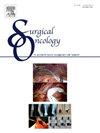Timing of TS1 adjuvant chemotherapy as a prognostic factor in recurrent pancreatic cancer after surgery
IF 2.4
4区 医学
Q3 ONCOLOGY
引用次数: 0
Abstract
Aim
Prognosis of pancreatic cancer is improved by combining postoperative adjuvant chemotherapy and preoperative adjuvant chemotherapy with surgery, while the importance of extended dissection surgery has decreased. To better understand prognostic factors of recurrence, we focused on the timing of postoperative adjuvant chemotherapy in patients with pancreatic cancer.
Methods
One hundred patients who underwent pancreatectomy or pancreaticoduodenectomy and chemotherapy for pancreatic cancer were classified into early and late postoperative adjuvant therapy initiation groups. Prognosis was evaluated retrospectively using known prognostic factors.
Results
On receiver operating characteristic analysis, optimum cut-off between the early (<52 days; n = 60) and late adjuvant initiation groups (≥52 days; n = 40) was 52 days. The two groups were well-matched, except the early initiation group had more surgeries with D2 lymph node dissection (75 % vs 48 %; p = 0.01); fewer postoperative complications (17 % vs 59 %; p = 0.04), including less postoperative pancreatic fistula (13 % vs 35 %; p = 0.03); and longer disease-free survival (0.7 years v 0.5 years; p = 0.02). On multivariate evaluation, early initiation and completion of adjuvant therapy were associated with increased overall survival, while early initiation was associated with prolonged disease-free survival.
Conclusions
Prognosis of patients with pancreatic cancer is improved by earlier rather than later initiation of postoperative adjuvant therapy.
TS1辅助化疗时机对胰腺癌术后复发预后的影响
目的:胰腺癌术后辅助化疗及术前辅助化疗联合手术可改善预后,扩大解剖手术的重要性下降。为了更好地了解复发的预后因素,我们关注胰腺癌患者术后辅助化疗的时机。方法:将100例行胰十二指肠切除术和化疗的胰腺癌患者分为术后早期和晚期辅助治疗起始组。采用已知预后因素对预后进行回顾性评价。结论:胰腺癌患者术后辅助治疗越早而不是越晚开始,其预后越好。
本文章由计算机程序翻译,如有差异,请以英文原文为准。
求助全文
约1分钟内获得全文
求助全文
来源期刊

Surgical Oncology-Oxford
医学-外科
CiteScore
4.50
自引率
0.00%
发文量
169
审稿时长
38 days
期刊介绍:
Surgical Oncology is a peer reviewed journal publishing review articles that contribute to the advancement of knowledge in surgical oncology and related fields of interest. Articles represent a spectrum of current technology in oncology research as well as those concerning clinical trials, surgical technique, methods of investigation and patient evaluation. Surgical Oncology publishes comprehensive Reviews that examine individual topics in considerable detail, in addition to editorials and commentaries which focus on selected papers. The journal also publishes special issues which explore topics of interest to surgical oncologists in great detail - outlining recent advancements and providing readers with the most up to date information.
 求助内容:
求助内容: 应助结果提醒方式:
应助结果提醒方式:


